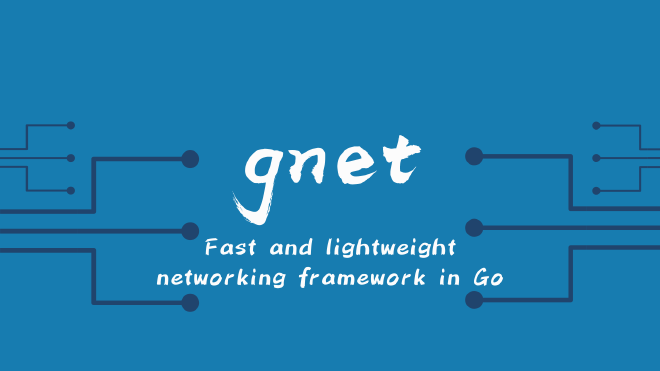Networking framework -- gnet

Table of Contents
📖 Introduction #
gnet is an event-driven networking framework that is ultra-fast and lightweight. It is built from scratch by exploiting epoll and kqueue and it can achieve much higher performance with lower memory consumption than Go net in many specific scenarios.
gnet and net don’t share the same philosophy about network programming. Thus, building network applications with gnet can be significantly different from building them with net, and the philosophies can’t be reconciled. There are other similar products written in other programming languages in the community, such as libuv, netty, twisted, tornado, etc. which work in a similar pattern as gnet under the hood.
gnet is not designed to displace the Go net, but to create an alternative in the Go ecosystem for building performance-critical network services. As a result of which, gnet is not as comprehensive as Go net, it provides only the core functionality (via a concise set of APIs) required by a network application and it doesn’t plan on becoming a coverall networking framework, as I think Go net has done a good enough job in that area.
gnet sells itself as a high-performance, lightweight, non-blocking, event-driven networking framework written in pure Go which works on the transport layer with TCP/UDP protocols and Unix Domain Socket. It enables developers to implement their own protocols(HTTP, RPC, WebSocket, Redis, etc.) of application layer upon gnet for building diversified network services. For instance, you get an HTTP Server if you implement HTTP protocol upon gnet while you have a Redis Server done with the implementation of Redis protocol upon gnet and so on.
gnet derives from the project: evio with much higher performance and more features.
🚀 Features #
🦖 Milestone #
- High-performance event-driven looping based on a networking model of multiple threads/goroutines
- Built-in goroutine pool powered by the library ants
- Lock-free during the entire runtime
- Concise and easy-to-use APIs
- Efficient, reusable, and elastic memory buffer: (Elastic-)Ring-Buffer, Linked-List-Buffer and Elastic-Mixed-Buffer
- Multiple protocols/IPC mechanisms:
TCP,UDP, andUnix Domain Socket - Multiple load-balancing algorithms:
Round-Robin,Source-Addr-Hash, andLeast-Connections - Flexible ticker event
-
gnetclient - Running on
Linux,macOS,Windows, and *BSD:Darwin/DragonFlyBSD/FreeBSD/NetBSD/OpenBSD - Edge-triggered I/O support
- Multiple network addresses binding
🕊 Roadmap #
- TLS support
- io_uring support
- KCP support
Windows version of gnet should only be used in development for developing and testing, it shouldn’t be used in production.
🎡 Use cases #
The following corporations/organizations use gnet as the underlying network service in production.
 |  |  |  |
 |  |  |  |
 |
If you’re also using gnet in production, please help us enrich this list by opening a pull request.